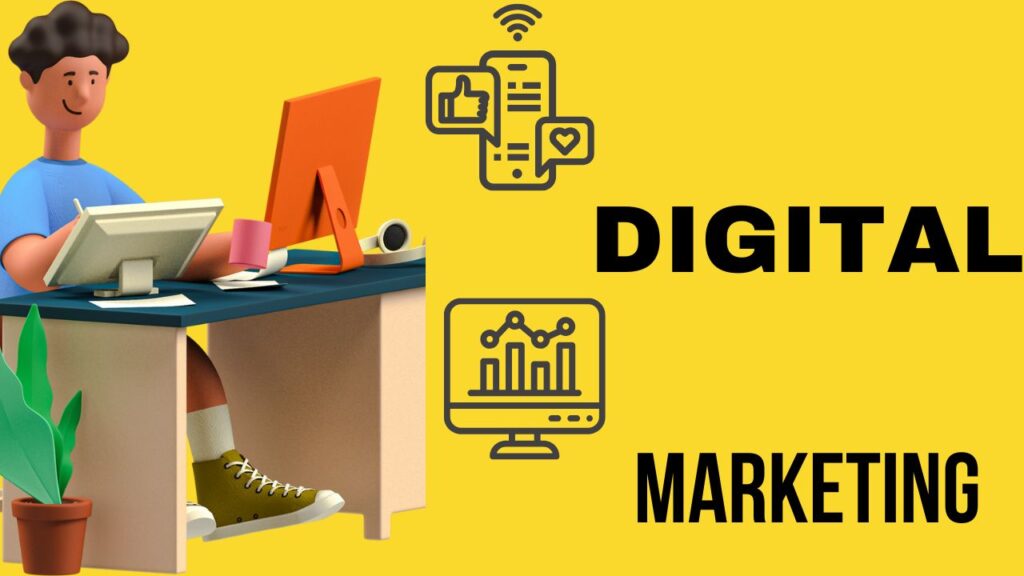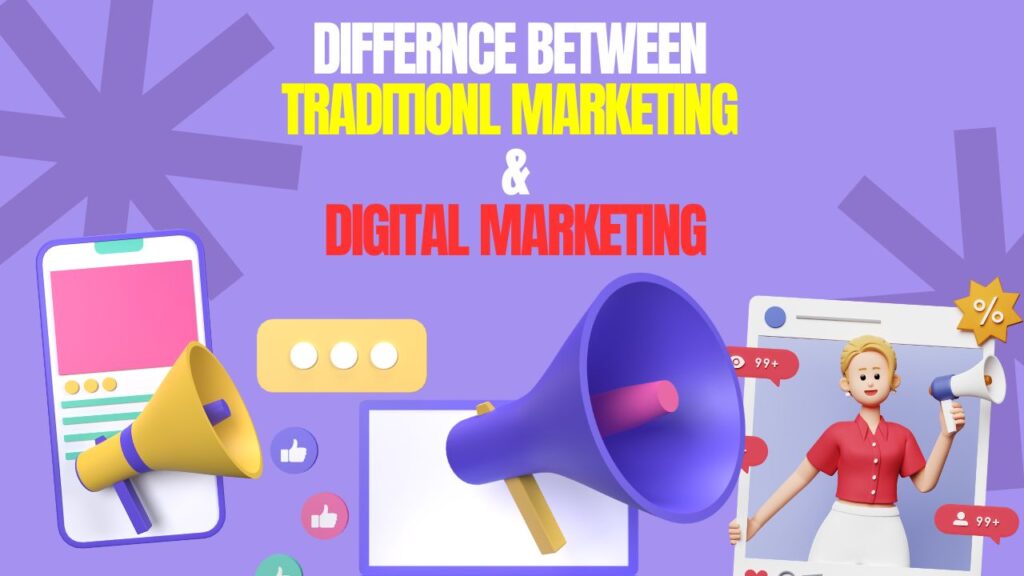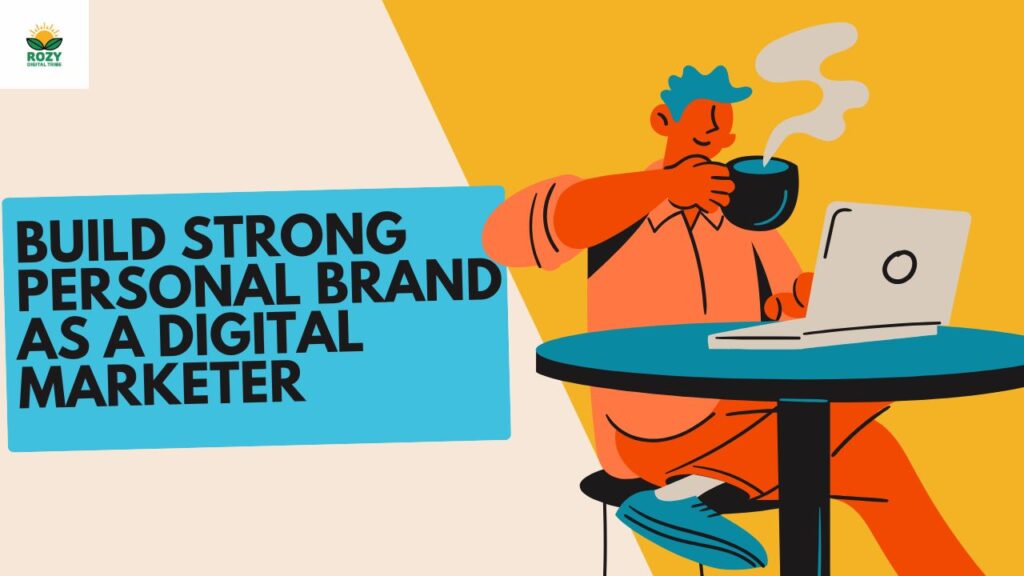Table of Contents
ToggleBuild Strong Personal Brand as a Digital Marketer
Build strong personal brand as a Digital Marketer. In today’s time, if you want to grow your business . you will have to show your strong presence in the online world.
In today’s digital landscape, a powerful personal brand can be the key differentiator for digital marketers looking to stand out. Building a recognizable and respected personal brand requires strategic effort, authentic engagement, and a consistent online presence.
If you want to strengthen your personal branding as a digital marketer, then how to do this? Today we will learn about this in details in this blog, so stay with us till the end.
What Is Digital Marketing?

Digital marketing is the practice of promoting products, services, or brands through various online channels and digital technologies. It encompasses a wide range of strategies, including search engine optimization (SEO), social media marketing, email marketing, content marketing, and paid advertising, to reach and engage with a target audience.
Unlike traditional marketing, digital marketing leverages the power of the internet to create more personalized, data-driven interactions that are measurable in real time. This approach enables businesses to analyze user behavior, track campaign performance, and refine their strategies for greater impact.
Digital marketing has become essential for businesses of all sizes, providing a cost-effective way to reach a global audience and build meaningful relationships with customers.
Difference Between Traditional and Digital Marketing

Let us now know what is the difference between traditional marketing and digital marketing. This is also important so that you can know how important branding is in the digital world.
Before knowing how to build strong personal brand as a digital marketer, it is important to know the difference between traditional marketing and digital marketing. Stay with us till the end.
Read Also -: Top 7 Digital Marketing Strategy for Beginners
1. Channels and Platforms
Traditional Marketing: Utilizes offline channels such as television, radio, newspapers, magazines, billboards, direct mail, and event sponsorships. These methods aim to reach a broad audience through physical or broadcast media.
Digital Marketing: Operates through online platforms such as social media, websites, email, search engines, and mobile apps. Digital marketing leverages the internet to target specific audiences with tailored messages across digital channels.
2. Targeting and Reach
Traditional Marketing: Often reaches a broad, general audience. Targeting is typically limited to demographic factors, like location or general interests, with less precision than digital strategies.
Digital Marketing: Allows for highly targeted marketing using detailed data on consumer behavior, interests, and demographics. Techniques like pay-per-click advertising, social media ads, and email marketing make it possible to reach a specific audience segment, which helps maximize relevance and impact.
3. Interactivity and Engagement
Traditional Marketing: Engagement is typically one-way, with the brand broadcasting its message and the audience passively receiving it. There are limited ways for consumers to engage directly with traditional marketing campaigns.
Digital Marketing: Offers two-way communication, enabling real-time engagement and feedback from the audience. Social media, email, and comment sections allow for direct interaction, where consumers can ask questions, provide feedback, or share the content, leading to more dynamic customer relationships.
4. Cost and Budgeting
Traditional Marketing: Generally requires a larger budget due to the high costs of television spots, print ads, and physical materials. Advertising in prime slots or high-circulation publications can be very costly.
Digital Marketing: Is often more cost-effective, especially for smaller businesses. Digital ads, social media posts, and email marketing campaigns can be scaled to fit a wide range of budgets, making digital marketing accessible for businesses of all sizes.
5. Measurability and Analytics
Traditional Marketing: Measurement of success can be challenging and is often based on estimations, such as TV ratings or print readership data. Metrics are less precise and harder to track accurately.
Digital Marketing: Offers robust analytics and precise tracking capabilities. Marketers can measure metrics such as click-through rates, conversion rates, customer acquisition costs, and return on investment in real-time, allowing for continuous optimization and data-driven decisions.
6. Speed and Adaptability
Traditional Marketing: Campaigns generally require more time for planning, execution, and changes. Once an ad is published or broadcasted, it is challenging to make adjustments.
Digital Marketing: Allows for faster execution and real-time adaptability. Campaigns can be launched and modified almost instantly, enabling marketers to respond quickly to market trends, feedback, and performance data.
7. Brand Awareness and Trust Building
Traditional Marketing: Often perceived as more credible because it’s associated with well-known media outlets and high-profile campaigns. Traditional channels, especially print, are sometimes seen as more trustworthy by older audiences.
Digital Marketing: Allows for a more personalized and relatable approach to building trust and brand awareness. Social media, influencer marketing, and user-generated content give brands a direct line to consumers, building credibility through social proof and customer testimonials.
Build Strong Personal Brand as a Digital Marketer

We will know in detail how you can build a strong personal brand as a digital marketer. Stay with us till the end.
1. Define Your Unique Value Proposition
Defining your unique value proposition is essential in establishing a strong personal brand as a digital marketer. A unique value proposition represents the specific qualities, skills, and expertise that set you apart from others in the field.
To create a compelling value proposition, identify your unique strengths and the core digital marketing skills you bring to the table—such as SEO expertise, social media strategy, or content creation.
Understanding your marketing niche is equally crucial, as it allows you to target a specific audience and tailor your messaging to their needs.
By articulating what makes you unique in a crowded digital landscape, you communicate a clear and valuable reason for clients and followers to choose your brand, reinforcing your reputation and authority in the industry.
Read Also -: 10 Best Way Earn Money By Mobile.
2. Develop a Consistent Brand Voice
Developing a consistent brand voice is key to building trust and recognition with your audience. Your brand voice reflects your personality and style, shaping how you communicate across platforms.
Whether you choose a professional, friendly, or witty tone, consistent messaging helps reinforce your brand personality, making your content instantly recognizable to your audience. Maintaining this consistency in every blog post, social media update, or video creates a unified experience that strengthens audience engagement.
By establishing a clear and relatable voice, you connect more deeply with your followers, making them feel more connected and likely to engage with your content regularly.
3. Leverage Social Media for Visibility
Leveraging social media for visibility is essential for building a strong digital presence and growing your brand. A robust social media presence on platforms like LinkedIn, Twitter, and Instagram can significantly expand your reach and connect you with a wider audience.
LinkedIn, for instance, is ideal for professional engagement, allowing you to showcase your expertise, share insights, and connect with peers in the digital marketing community.
Twitter is effective for real-time updates and joining industry conversations, while Instagram provides a visual platform to showcase creative projects or behind-the-scenes glimpses of your work.
Engaging consistently on these platforms helps you establish authority, gain followers, and build meaningful connections within your field, ultimately boosting your visibility and credibility as a digital marketer.
4. Create and Share Valuable Content
Creating and sharing valuable content is a cornerstone of effective content marketing and is key to building authority in digital marketing. Educational content—whether through blog writing, video marketing, or downloadable resources—serves as a way to provide genuine value to your audience.
Writing informative blog posts, for example, helps you address your audience’s questions and establish yourself as a trusted source. Video marketing allows you to connect on a personal level, making complex topics easier to understand through visual explanations.
By consistently delivering high-quality content that informs, educates, and engages, you reinforce your expertise and credibility, ultimately building a loyal audience who views you as an authority in your field.
5. Optimize Your Website or Portfolio
Optimizing your website or portfolio is essential for establishing a professional digital presence that attracts and impresses potential clients or employers. A personal website serves as a central hub where visitors can learn about your expertise, view your work, and connect with you.
By focusing on SEO optimization, you increase the chances of your website appearing in search engine results, making it easier for people to find you online. Including case studies in your portfolio is also valuable, as they provide real examples of your skills and highlight the impact of your work.
Together, these elements create a strong digital presence that showcases your capabilities, builds credibility, and drives more opportunities to grow your brand.
6. Engage with Your Audience Regularly
Engaging with your audience regularly is vital for building a loyal following and fostering genuine connections. Audience interaction, such as responding to comments, answering questions, or joining conversations, shows that you value your followers and are invested in their success.
Community building goes beyond simple engagement; it creates a space where followers feel heard and appreciated, helping to foster a sense of belonging. This consistent brand engagement not only increases visibility but also strengthens follower trust.
When your audience knows they can rely on you for thoughtful responses and valuable insights, they’re more likely to support and recommend your brand, helping you cultivate a community that grows and sustains your success.
7. Network with Industry Leaders
Networking with industry leaders is a powerful strategy for professional growth and expanding your influence in digital marketing. By connecting with established digital marketing leaders, you gain access to valuable insights, emerging trends, and best practices that can enhance your skills.
Industry networking also provides opportunities to learn from experts who have successfully navigated challenges similar to those you may face. Building relationships with leaders and peers in your field not only boosts your visibility but also opens doors for collaboration, mentorship, and knowledge-sharing.
These connections can significantly accelerate your career, strengthening both your expertise and your personal brand in the digital marketing community.
8. Monitor Your Brand Reputation
Monitoring your brand reputation is essential for maintaining a positive online presence and protecting your digital footprint. Regularly tracking how your brand is perceived online allows you to address any negative feedback or misconceptions before they escalate.
Brand monitoring tools can help you stay on top of mentions, reviews, and comments across various platforms, giving you insights into how your audience views your work. By actively managing your reputation, you ensure that your brand remains aligned with your values and maintains the trust of your followers.
A strong, well-maintained reputation helps to strengthen your credibility and influence in the digital space.
Read Also -: Digital Marketing and Social Media Marketing
9. Invest in Continuous Learning
Investing in continuous learning is vital for staying relevant and competitive in the ever-evolving field of digital marketing. Pursuing digital marketing certifications, attending workshops, and participating in skill development programs allow you to keep up with industry trends and refine your expertise.
By staying informed on new tools, strategies, and market shifts, you demonstrate a commitment to growth that enhances your brand credibility.
Regularly updating your skills not only makes you more effective as a marketer but also reinforces your reputation as a knowledgeable, trustworthy professional who adapts to industry changes. Continuous learning positions you as an industry leader and boosts the long-term value you bring to your audience and clients.
Conclusion
Now we have come to the conclusion of this blog. In this blog, we have learnt what is digital marketing and also learnt the difference between traditional marketing and digital marketing and learnt in detail about build strong personal brand as a digital marketer.
Building a strong personal brand as a digital marketer is not just about having a recognizable name or logo. It’s about consistently showcasing your expertise, providing value to your audience, and creating meaningful connections.
By establishing trust and credibility through content, networking, and delivering results, you can position yourself as a thought leader in your niche. Remember, personal branding is a continuous journey that requires patience, authenticity, and a commitment to personal growth.
Stay true to your unique skills and values, and over time, your personal brand will set you apart in the competitive world of digital marketing.
If you also want to become a satisfied digital marketer then hello my name is Rozy Sawant I am a digital marketing coach and consultant I teach digital marketing many of my students are changing their lives by learning digital marketing from me.
If you also want to learn digital marketing professionally then Register for my workshop this workshop is absolutely free I will meet you soon in my workshop.
